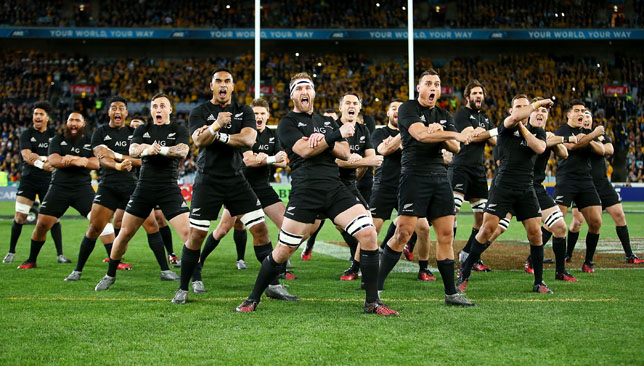
The Rugby World Cup is just days away, with Russia and first-time hosts Japan set to get the ninth hosting of the game’s shiny showpiece under way in Tokyo on Friday.
The Brave Blossoms made a splash four years ago when they beat South Africa to spark the World Cup’s greatest ever shock, and the Far East nation will be hoping to go far again in making an impression on the international stage in hosting the spectacle.
It is the first World Cup not to be held in a traditional rugby stronghold. New Zealand, Australia, South Africa, England, Ireland, Wales, Scotland and France have all previously played host so everyone is expecting something wonderful from the ninth World Cup.
Here, we take a little stroll down memory lane and remember each of the previous eight World Cups.
1987
⏰ WORLD CUP COUNTDOWN | A moment so amazing it has been immortalised in a statue outside Eden Park. Michael Jones dives over to score the first try of the 1987 Rugby World Cup.
— All Blacks (@AllBlacks) September 13, 2019
Who do you think will score the All Blacks first try at #RWC2019? pic.twitter.com/2Cvnws8ilS
Hosts: New Zealand/Australia
Champions: New Zealand
Top points scorer: Grant Fox (New Zealand) 126
Most tries: Craig Green and John Kirwan (both New Zealand) 6
Strange to think that whereas the inaugural football World Cup took place in 1930 and the Cricket World Cup dates back to 1975, the first-ever Rugby World Cup only took place 32 years ago. Even the Rugby League World Cup has been held since 1954.
Eden Park enjoyed the honour of hosting the maiden World Cup match, New Zealand winger John Kirwan scoring from Italy’s kick-off in a 70-6 romp for the co-hosts – the margin of victory was to become a theme of their march to overall glory.
Back in the days before professionalism, there was no qualification for the tournament so it was comprised of the IRFB’s (International Rugby Football Board, now World Rugby) seven members – England, France, Ireland, Australia, New Zealand, Scotland and Wales.
The remaining nine places were filled by invited teams, Western Samoa controversially excluded despite their superior playing standard. South Africa were unable to compete due to their international sporting boycott sparked by apartheid.
The All Blacks beat France 29-9 in the final – the 20-point margin of victory was their smallest of the tournament. Wales finished a surprise third – their best-ever result – after beating co-hosts Australia 22-21 in the third-place play-off.
1991
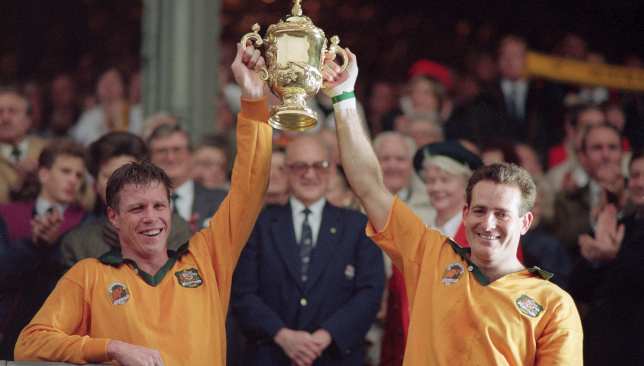
Wallabies Nick Farr-Jones and David Campese hold the trophy aloft in 1991.
Hosts: England, Wales, France, Ireland, Scotland
Champions: Australia
Top points scorer: Ralph Keyes (Ireland) 68
Most tries: Jean-Baptiste Lafond (France) and David Campese (Australia) 6
The second edition will be remembered for the rise of rugby’s popularity which in itself led to a tournament filled with shocks as smaller nations roared.
There were fewer one-sided matches compared to 1987 with the World Cup’s first major shock delivered by debutants Western Samoa, who beat Wales, the third-placed team four years earlier, 16-13 in Cardiff, leading to their eventual exit at the pool stage.
Canada finished second in their pool behind France to qualify for the quarter-finals – the only time they’ve made the knockouts. Fiji, the 1987 quarter-finalists, finished bottom of Pool 4 after losing 17-15 to unfancied Romania.
The roaring success of the first World Cup saw the second edition receive increased attention and it was seen as a major global sporting event for the first time, with the hosting heading to the northern hemisphere.
Qualifying was introduced as the number of possible entrants increased from 16 nations to 33. The eight quarter-finalists from 1987 qualified automatically with the remaining eight spots contested by 25 countries.
In the match of the tournament, Australia pipped Ireland 19-18 in a thrilling quarter-final at Lansdowne Road, with a last-gasp try from Michael Lynagh. They beat reigning champions the All Blacks in the semis before overcoming England 12-6 in the final at Twickenham.
1995
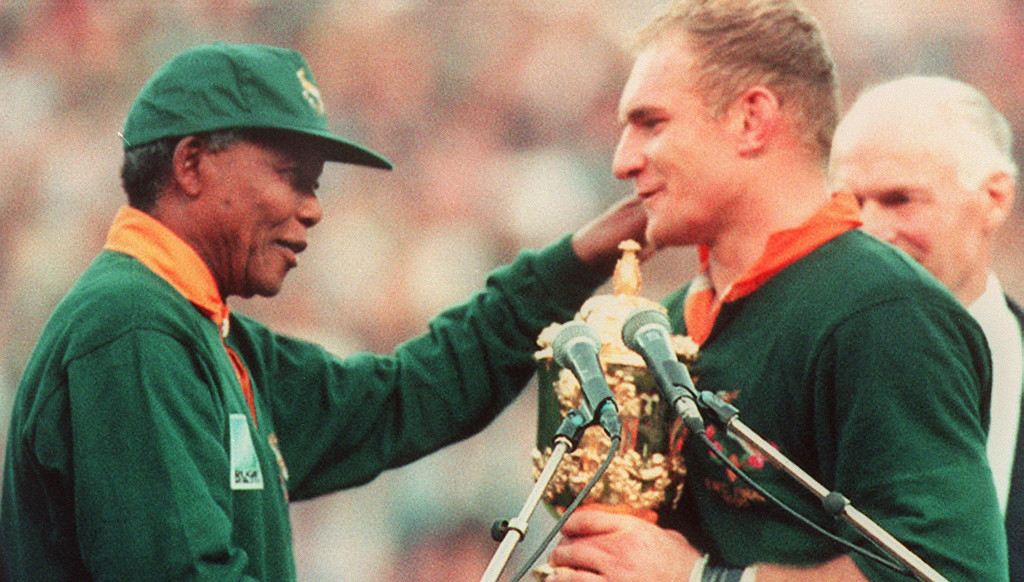
Mandela hands the World Cup over to Springboks skipper Francois Pienaar.
Hosts: South Africa
Champions: South Africa
Top points scorer: Thierry Lacroix (France) 112
Most tries: Jonah Lomu and Marc Ellis (both New Zealand) 7
The tournament that will be remembered for rugby transcending sport in the Rainbow Nation. South Africa, competing at their first World Cup having been banned from the first two due to apartheid, claimed a heart-warming home win.
The abiding image is the embrace shared between Francois Pienaar and president Nelson Mandela, donning a Springboks jersey and cap, presenting the Webb Ellis Cup to the South African captain.
In a closely contested final at Ellis Park, Boks fly-half Joel Stransky scored all of the host nation’s points in a 15-12 victory, including a drop goal in extra time to win the match.
It was the first major sporting event held in South Africa following the end of apartheid. They had only been readmitted to international rugby in 1992.
It was the first Rugby World Cup to be held exclusively in one country and will be remembered as the last major event of rugby union’s amateur era – two months later, the IRFB opened the sport to professionalism.
Besides South Africa’s triumph and coming together, the World Cup will be recalled for the monster impact of mammoth New Zealand winger Jonah Lomu who finished as joint top try scorer. The All Blacks demolished England 45-29 in the semi-finals, a game in which Lomu famously finished with four scores.
1999
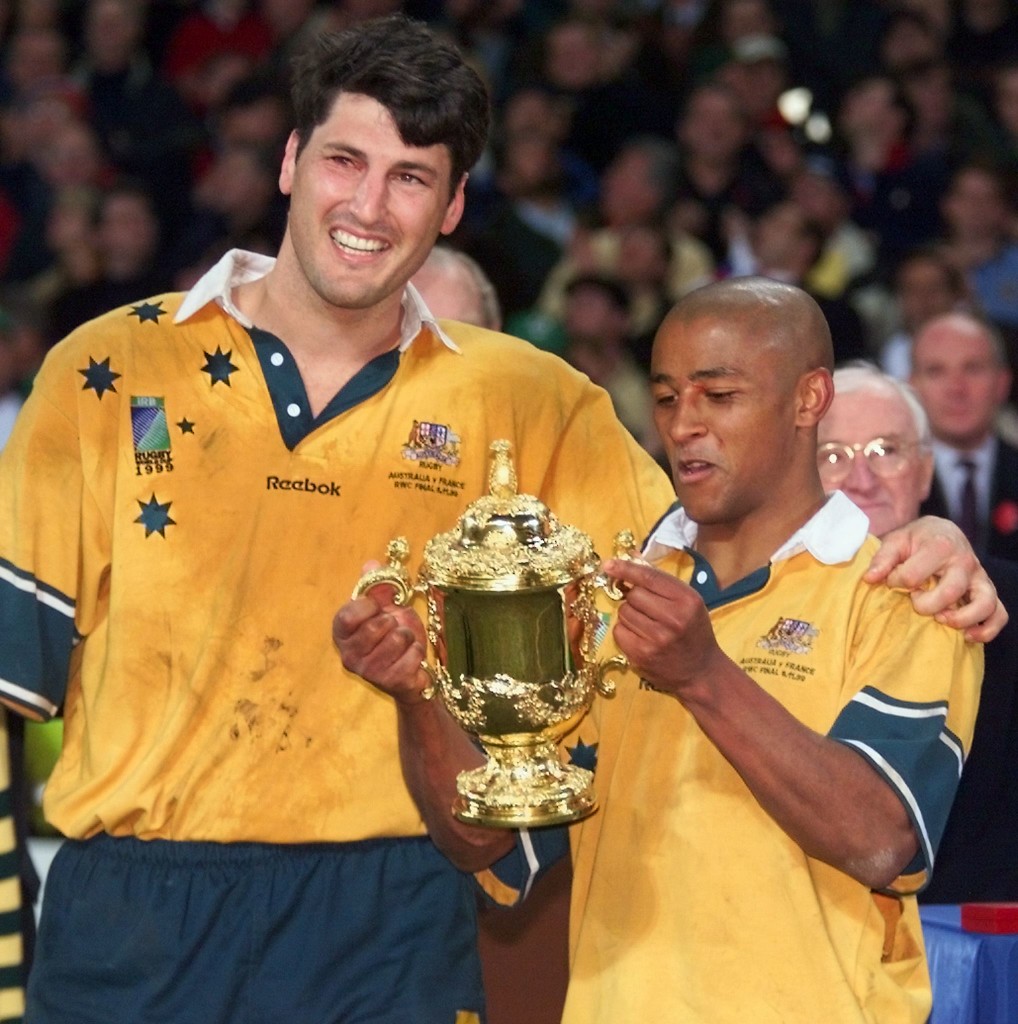
John Eales and George Gregan lift the trophy in 1999.
Hosts: Wales
Champions: Australia
Top points scorer: Gonzalo Quesada (Argentina) 102
Most tries: Jonah Lomu (New Zealand) 8
Some classic encounters and Australia becoming the first team to lift the Webb Ellis Cup twice were among the highlights of the 1999 World Cup – the first to be held in the professional era.
The tournament grew to 20 teams, divided into five pools and necessitating a complicated quarter-final play-off round involving the five runners-up and best third-placed team to decide who would join the pool winners in the last eight.
The number of automatic qualification places was down to just four; Wales qualified as hosts, as did South Africa, New Zealand and France as the best three teams from ’95.
The newly-built Millennium Stadium hosted the first game and the final, in which the Wallabies overcame France 35-12 – in doing so they became the only team to win having had to qualify for the tournament.
The semi-finals produced two of the most dramatic matches in tournament history. Australia beat champions South Africa 27-21 in extra-time. The second semi-final between favourites New Zealand and underdogs France was an all-time classic, as Les Bleus overturned a 24-10 half-time deficit to claim an epic 43-31 victory and reach their second World Cup final.
2003
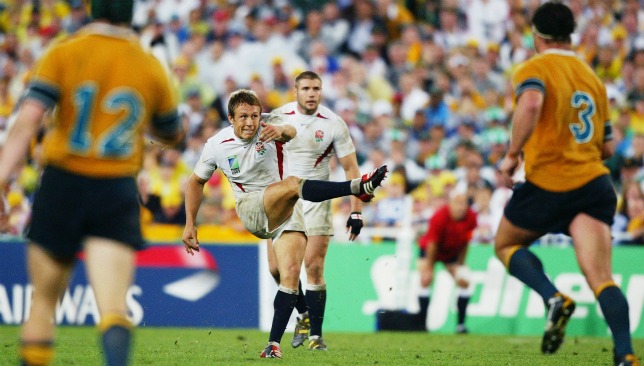
Wilkinson scores the drop goal that won England the World Cup in 2003.
Hosts: Australia
Champions: England
Top points scorer: Jonny Wilkinson (England) 113
Most tries: Doug Howlett and Mils Muliaina (both New Zealand) 7
As we get set to enjoy the ninth Rugby World Cup, there’s arguably never been more northern hemisphere teams in with a shout of success, with England, Ireland and Wales all realistically capable of winning.
But, to date, the only World Cup won by a team from the north was England Down Under 16 years ago.
The complex pool format used in 1999 was scrapped with tradition restored; 20 teams divided into four pools of five nations, with the top two in each pool moving on to the knockout stage. It was then the largest tournament to be played and a bonus point system was implemented in pool play for the first time.
Jonny Wilkinson, arguably the greatest 10 to ever play the game, was instrumental in victory, kicking the winning drop goal in extra time to give the resplendent Red Rose a 20-17 win – the second final that had gone beyond 80 minutes.
Wilkinson was wonderful throughout but especially in the final and semi-final, during which he scored 39 of England’s 44 points. Only Jason Robinson’s try in the final punctuated the scoring from the brilliant boot of Wilkinson, who was terrific in the torrential rain of Sydney as England beat France 24-9 in the semis.
2007
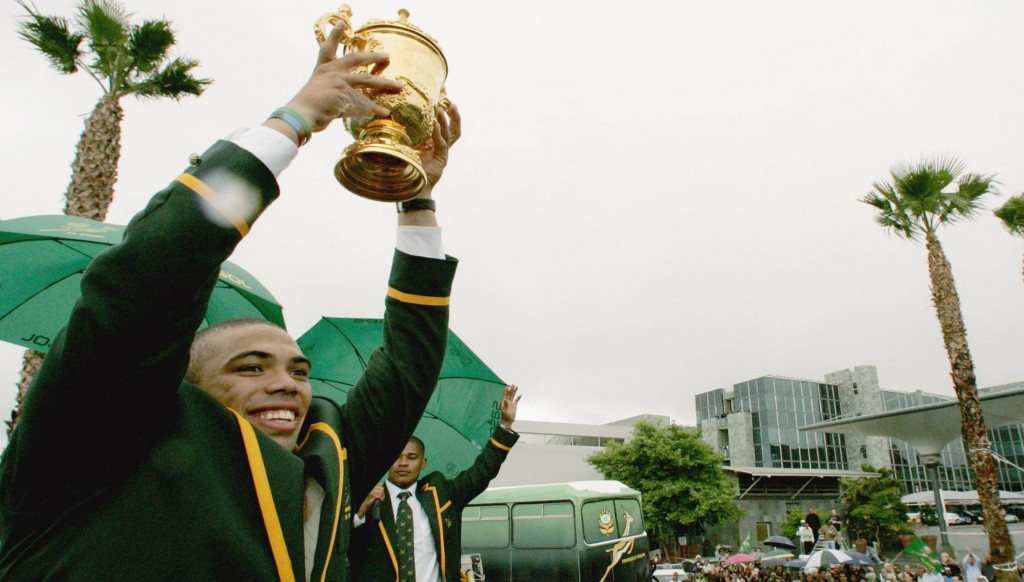
Bryan Habana lifts the Webb Ellis Cup aloft.
Hosts: France
Champions: South Africa
Top points scorer: Percy Montgomery (South Africa) 105
Most tries: Bryan Habana (South Africa) 8
After blossoming in Australia, the Red Rose wilted four years later amid the chaos and controversy of Brian Ashton’s calamitous reign. No direction or leadership from Ashton, disharmony among the coaching team and players, including captain Phil Vickery, talking openly of returning home early were just a few of the problems that dogged the world champions in France.
And yet, after a torturous start, including a nervy win over amateurs the USA and a 36-0 thrashing at the hands of South Africa, they made the final. They lost 15-6, beaten for a second time by the Springboks, but it was a miracle they even got there.
On the eve of their quarter-final against Australia, a group of backs, including Wilkinson, met to devise their own strategy for that clash, as a contingency plan. Unbelievably, despite being in such turmoil, they won and then beat France in the semis to make the final.
Elsewhere, the Boks joined the Wallabies in winning their second title. Full-back Percy Montgomery top-scored with 105 points, including converting four of their five penalties in the final at the Stade de France.
Portugal, the only wholly amateur nation in France, made their World Cup debut.
2011
⏰ WORLD CUP COUNTDOWN | With 11 days to go until #RWC2019 kicks off, we remember the spine-tingling moment the Haka met the Sipi Tau in 2011. pic.twitter.com/bdhBenoVHi
— All Blacks (@AllBlacks) September 9, 2019
Hosts: New Zealand
Champions: New Zealand
Top points scorer: Morne Steyn (South Africa) 62
Most tries: Chris Ashton (England) and Vincent Clerc (France) 6
The World Cup returned to the Land of the Long White Cloud and New Zealand’s long wait for a second title was also over after 24 years of near misses and disappointment.
A narrow 8-7 win in the final over France exorcised personal demons – having lost to Les Bleus in the 1999 semis and 2007 quarters – as well as collective ones. Since their victory at the inaugural showpiece in 1987, the All Blacks had been defeated in one final and three semi-finals.
The tournament had opened on a sour note too with damage to Stadium Christchurch caused by an earthquake just months before the World Cup, with matches set to be staged there relocated. So that, plus nearly a quarter of a century of hurt, were all put to rest when Richie McCaw lifted the Webb Ellis aloft in Auckland following a brilliant effort from a Thierry Dusautoir-inspired France – themselves fortunate to scrape by 14-man Wales in the semi-finals.
Fly-half Stephen Donald’s penalty ended up being the crucial score. That fact was made all the more remarkable in light of the fourth-choice fly-half only being called into the All Blacks’ squad two weeks before the final due to Dan Carter and Colin Slade injuries.
Aaron Cruden hyper-extending his knee just before half-time in the final resulted in Donald – a man who had been fishing for whitebait on the Waikato River a fortnight earlier – entering the fray and providing the match-winning moment.
2015
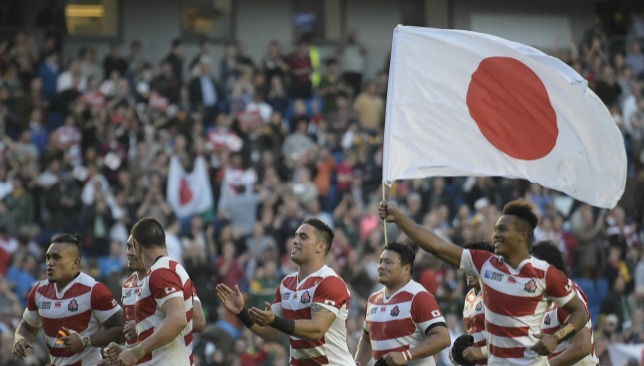
Japan shocked the world with their win over South Africa in 2015.
Hosts: England
Champions: New Zealand
Top points scorer: Nicolas Sanchez (Argentina) 97
Most tries: Julian Savea (New Zealand) 8
From World Cup failures to the force of world rugby, New Zealand became the first team to retain the Webb Ellis Cup and the most successful team in the competition’s history four years ago.
They eventually put southern hemisphere rivals Australia to the sword with a swashbuckling 34-17 triumph at Twickenham. A new record for tries in a final was set with the teams combining for five scores, surpassing the previous record of four in 1987.
Japan set the tone for a tournament full of drama and shocks on the opening weekend, overcoming South Africa 34-32 thanks to a stunning 80th minute Karne Hesketh try. A bright display in Brighton saw the Brave Blossoms record the biggest shock in World Cup history, which subsequently cascaded down.
A thrilling 28-23 win at Twickenham for Wales in a tough Pool A saw hosts England eventually eliminated at the first hurdle – the first solo hosts not to make it to the knockouts.
It was the first World Cup not to feature a northern hemisphere team beyond the quarter-finals too, with an awesome Argentina performance in the last eight earning the Pumas a pulsating 43-20 triumph over Ireland.